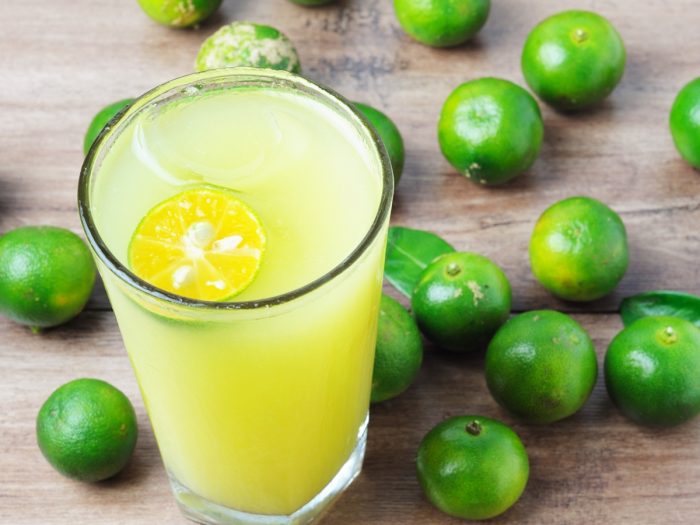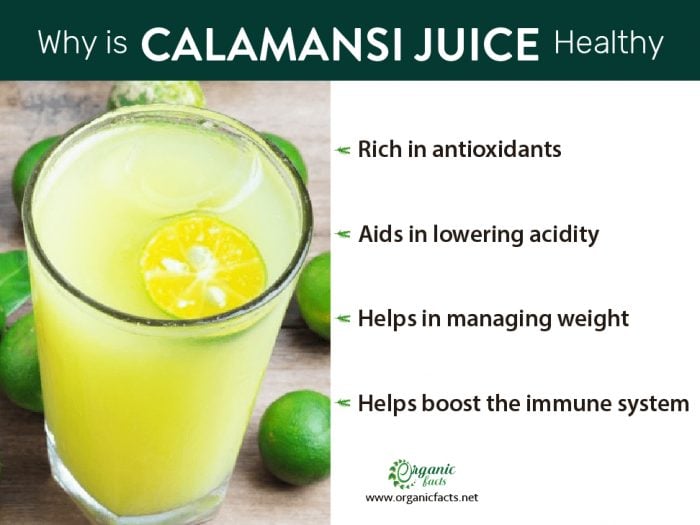Drinking calamansi juice is a very popular practice in certain parts of Asia, due to its detoxifying ability on the body, the availability of the fruit, the tart, and the unique flavor of the juice.
What is Calamansi Juice?
Calamansi juice is derived from the calamansi fruit, a variety of citrus fruit commonly called golden lime. Calamansi is also known as calamondin or Philippine lime, and scientifically known as Citrofortunella macrocarpa. The fruit is a hybrid of a member of the citrus genus, that is to say, orange and kumquat, and is widely cultivated in Southeast Asia, particularly in the Philippines. This sour fruit is rich in vitamin C and certain antioxidants, such as limonene, as well as potassium, vitamin A, and calcium. Although the juice of this fruit is sour, many people still consume it regularly as it is perceived to have multiple health benefits. [1] [2]
Benefits of Calamansi Juice
The top benefits of calamansi juice may include its ability to boost the immune system, soothe acidity, aid in weight loss, stimulate growth and repair, bleach the skin, detoxify the body, lower cholesterol, manage diabetes, and give relief from respiratory infections, among others.
May Help Control Cholesterol Levels
Anecdotal evidence and some studies have found that this juice might help lower your cholesterol levels, which is an important step towards weight loss and avoiding metabolic syndrome. It may also help lower your risk of atherosclerosis. Furthermore, a study from the University of the Immaculate Conception talks about the antiangiogenic and antioxidant properties of calamansi peel ethanolic extract. [3]
Can Boost Immunity
Packed with vitamin C and other beneficial nutrients, calamansi juice has been used in folk medicine as an immune booster for generations. It seems to have the potential to stimulate the production of white blood cells and counter the negative effects of free radicals, thanks to its antioxidant and antibacterial properties. [4]
May Potentially Lower Acidity
Despite the high levels of citric acid of this fruit, many people drink it as a soothing substance for the stomach. A study published in the Journal of International Oral Health throws light on the anti-inflammatory property of tannins from the rind of calamansi. This potentially may help lower the levels of inflammation when consumed in moderation. It may also lower your risk of developing ulcers, protecting you from acid reflux disease. [5] [6]

Freshly made calamansi juice Photo Credit: Shutterstock
Can Help Promote Collagen Production
Vitamin C is a crucial element in collagen production, which is the compound needed to create every tissue in the body. Rich in this particular vitamin, this juice can deliver a burst of ascorbic acid that may facilitate your body’s ability to grow, as well as repair damage from injury, illness, or surgery. [7]
May Aid in Diabetes Management
After a a 2019 study published in the journal Biomolecules. determined the presence of isoflavone naringenin in calamansi juice, further research, cited in the International Journal of Science and Research, was done on the blood sugar-moderating effects of it. The results shown positive implications for regulating the release of glucose and insulin into the bloodstream, which is excellent news for those with diabetes or at the risk of developing it. [8] [9]
Can Play An Active Role in Weight Loss
This tropical juice is legendary in folk medicine for its impact on weight loss, as are many lemon and lime-based juices. It may potentially have the ability to not only boost a person’s metabolism but also eliminate many of the toxins in the body that contribute to fat storage.
By increasing metabolic speed, this juice can improve passive fat-burning throughout the day, detoxifying the body and helping all your organ systems run more smoothly and function properly, aiding in calorie burn. Many people drink a glass of calamansi juice every morning to stimulate the body and achieve weight-loss goals.
However, there is a lack of research to support these claims, and more studies are needed to examine the effects of this juice on weight management.
Might Improve Respiratory Health
The strong citric acid level in calamansi juice is considered by many cultures to cut through phlegm and mucus, where infections often live and propagate, while also soothing inflammation in the throat and respiratory tracts. [10]
Skin Care
In Asia, people use calamansi juice on their skin as a natural bleaching agent. In addition to clearing the skin of blemishes or discoloration, it can also deliver antioxidants to the skin that prevents wrinkles and other signs of aging. [11]

In Asia, people use calamansi juice on their skin as a natural bleaching agent.
May Help in Body Detoxification
Known for its ability to potentially stimulate urination and flush out waste from the kidneys, calamansi juice is thought by many cultures to be a powerful detoxifying agent. Moreover, it may also strengthen liver, kidney and gall bladder functioning helping you eliminate excess toxins. [12]
Calamansi Juice Recipe
You can easily make calamansi juice at home, provided you have access to these exotic fruits. Outside of Southeast Asia, your best chance of finding these fruits is in specialty grocery stores or import stores.

How to Make Calamansi Juice: Easy Recipe
Ingredients
- 12-14 calamansi fruits
- 3/4 cup sugar or honey
- 2 cups water
Instructions
- Wash the calamansi fruits thoroughly.
- Slice them into half and use a lemon squeezer to extract the juice.
- Alternatively, you could slice off the top of the limes, being careful not to cut into the seeds. Using your hands, squeeze out as much juice as possible from the limes into a strainer.
- Add the sugar and water to the fresh calamansi juice and stir thoroughly.
- Taste the juice, and if it is too astringent or sour, add more sugar or water. Some people add honey in significant quantities (1 cup) to balance out the taste.
- Refrigerate the juice, serve chilled, and enjoy!

Notes
Calamansi Juice Substitutes
You may find it difficult to source calamansi limes in certain parts of the world. If you need to swap out this juice with a more common one, the best substitutes for calamansi juice include the following:
- Regular lime juice
- White wine vinegar
- White wine
- Tamarind
- Black lime
These substitutes can mimic the acidity and tartness, and even deliver some of the same health benefits.
Potential Side Effects of Calamansi Juice
This simple juice has many impressive health benefits but may cause gastrointestinal distress and a heightened risk of kidney problems. It is better to consult a doctor before adding this juice to your diet.
- Stomach Issues: While many people praise calamansi juice for its detoxifying and anti-inflammatory properties, it is still an astringent and a potentially irritating substance for the stomach. If you have a sensitive gut, be sure to moderate your intake of calamansi juice to prevent acid reflux, diarrhea, stomach problems, and cramping.
- Kidney Health: With a high level of vitamin C and the ability to stimulate urination, this fruit juice may detoxify the body. However, for people with kidney issues, diuretics can lead to numerous complications and even a worsening of your condition.
